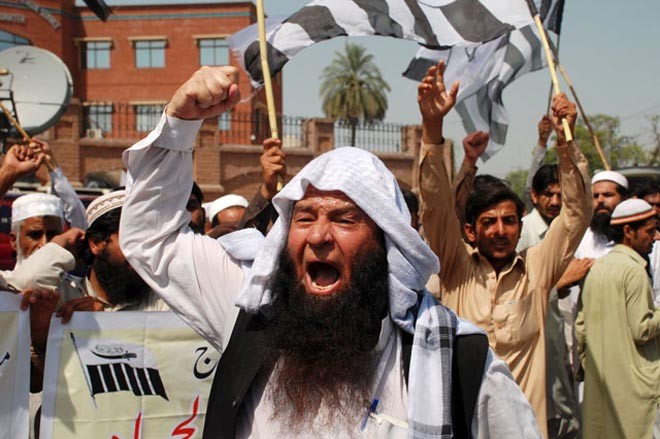
There is lack of a clear policy on the future of banned groups despite the existence of NAP

Two years after the National Action Plan (NAP) was announced, tackling proscribed organisations and effectively controlling hate speech and literature have seen little progress.
The re-emergence of banned extremist groups, sympathising with terrorist organisations, and endorsing their policies are the most contentious issues among the 20 points of NAP. Also, performance of the official committee to suggest measures against proscribed groups and individuals under new labels is not much publicised.
A Supreme Court of Pakistan inquiry report on Quetta suicide bombing in August this year that left over 70 people dead and 112 injured, has called for taking strict action against terrorist and officially proscribed organisations.
Justice Qazi Faez Isa who headed this single member judicial commission to probe into Quetta attack in his report released last week (December 13), states, "Another monumental failure has been the lack in silencing extremist speech, literature, and propaganda. There has been a complete failure in producing and then disseminating a counter narrative; an attempt has been made to attend to this void."
In the past few weeks, there have been public appearances of many proscribed extremist organisations in different parts of the country, including the capital city of Islamabad.
There are examples of sanctioning relaxations to such proscribed groups and people on the fourth schedule (under observation) by the sitting government. A couple of weeks ago, son of a founder of proscribed organisation -- Ahl-e-Sunnah-Wal-Jamaat (ASWJ), formerly Sipah Sahaba Pakistan, was allowed to contest general elections for a provincial seat in Jhang city. He was officially placed on the fourth schedule of the Punjab government two years ago.
Read also: No authority to counter terrorism
Last week, Jamaat-ud-Dawah (JuD), an organisation under observation according to official records, held a big rally in Karachi, protesting against the recently passed law to stop forced conversions and fixing the age of conversion at 18. In another example, hate speech has been largely reported in Punjab against the Ahmadi community after a violent clash and attack on an Ahmadi worship place in district Chakwal ended up in two deaths -- one from each side. The electronic media kept the public in the dark about this incident to avoid possible spread of tension, an argument refuted by rights activists.
"Provinces are supposed to implement and monitor the implementation in true spirit," says Tasneem Noorani, former interior secretary and one of the officials who formulated NAP. "However, we see a lack of political will, especially in implementing points related to hate speech and taking action against proscribed organisations."
"The fear of counter attacks from such groups appears to be a major reason behind not taking full action against such groups," Noorani says.
Till the mid 2016, according to Nacta statistics, as many as 1,808 terrorists were killed and 5,611 arrested since the NAP launch. As many as 122,772 combing operations were carried out while 142,335 suspects were arrested. As many as 43 proscribed organisations have been categorised as violent against the state, 12 as non-violent but anti-state, and seven as armed but not anti-state.
Nacta claims strict implementation of law on the issue of glorification of terrorists through Pakistan Electronic Media Regulatory Authority (PEMRA), and ministry of information and broadcasting. Any violation is reported to the quarters concerned and action taken.
Point five of the NAP calls for "strict action against literature, newspapers and magazines promoting hatred, extremism, sectarianism, and intolerance". Point nine of NAP calls for an end to religious extremism and protection of minorities while point 18 deals with sectarian elements.
Regarding proscribed organisations, point three states, "Militant outfits and armed gangs will not be allowed to operate in the country" while point 7 reads, "Defunct outfits will not be allowed to operate under any other name." Moreover, point 13 and 14 say "Communication network of terrorists will be dismantled completely" and "concrete measures against promotion of terrorism through internet and social media."
It has also been reported in various inquiry reports on terrorist attacks that members from banned outfits have been operating in the form of target killers, suicide bombers, and perpetrators of sectarian violence. They have both physical and online presence in different parts of the country, mainly Karachi and Quetta.
"The continued existence and power of violent extremists in Pakistan has many reasons," says Raza Rumi, a US-based writer and journalist.
"There is lack of a clear policy on the future of these groups despite the existence of NAP. The continuation of national security set by the military in the 1980s, where sectarian and jihadist militias were made into cornerstones of national security, remains an issue," he says.
"Another reason is lack of introspection that these groups far from bolstering our defence have become liabilities," he adds.
According to Nacta’s data, there are 63 proscribed organisations, including some with new names and two are listed under United Nations Security Council Resolution 1267. According to a report of Center for Research and Security Studies (CRSS), a security think tank, "Pakistan has formally declared 212 outfits as proscribed organisations in June 2015. The ministry of foreign affairs banned 171 organisations, while the interior ministry banned 63 organisations. There is an overlap of 10 organisations banned by both ministries. Meanwhile, JuD has been put on the watch list by the interior ministry."
The Quetta blast inquiry report states, "This country was created by those who wanted to ameliorate the condition of the Muslims of the subcontinent, and to uphold the freedoms of those of every faith. The message of Unity, Faith, and Discipline was unfortunately sabotaged by hypocrites and extremists and needs to be rejected. The original motto needs to be reclaimed, and in doing so, we will come closer in ensuring that fundamental freedoms are safeguarded."